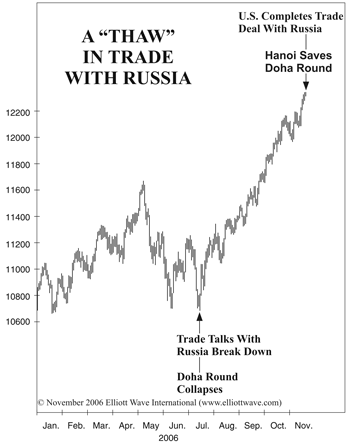
We covered the revived forces of globalization here on October 12. The rise and fall of trade barriers between nations is probably the single best measure of the wax and wane of globalization. The chart shows the latest swing from a break down near the Dow Jones Industrial Average’s summer low and the latest success as the DJIA surged to its latest all-time high. Russia, the largest country still outside the 149-nation World Trade Organization, is the last to gain membership because it was the primary nemesis of the United States at the Cold War lows of 1949, 1974 and 1982.
Another major manifestation of the swing from the July lows, was the apparent “rescue” of the Doha round of trade talks, which were pronounced dead by many observers last July. Here’s the story:
Hanoi Saves Doha Round
HANOI, Nov. 20 (Bernama) -- The just-concluded Asia-Pacific Economic Cooperation (APEC) summit here was a victory for the multilateral trading system. Apec leaders gave the Doha Round the much-needed therapeutic massage that would bring the comatose trade liberalisation talks on its feet again with calls for an immediate resumption of the World Trade Organisation (WTO) negotiations.
The Doha talks broke down last July due to disagreements between rich and poor countries, mostly among India, Brazil, the European Union, the US, Japan and Australia over farm subsidies.
But the APEC leaders, in the Hanoi Declaration issued at the conclusion of the two-day summit Sunday, pledged their commitment to end the stalemate of the Doha Round.
"The consequences of the failure of the Doha Round would be too grave for our economies and for the global multilateral trading system," said the declaration.
By distancing the talks from “security” issues like North Korea’s nuclear program, trade negotiators appeared to clear the way from renewed progress, but these tensions are just preliminary tremors. The resumption of a downturn in social mood should heighten international disagreements and stop the recent progress in its tracks. Various development covered here over the last year, from the fight over Arab ownerhsip of U.S. ports to the growing population of anti-U.S. leaders in Latin America (Sandinista leader Daniel Ortega just returned to power), foreshadow impediments to free trade going forward. The exclusionary impulses of a big bear market always find expression in the arena of global commerce. As we stated here last December when talks hit an impasse, Doha should be the first trade round to fail since the last Supercycle-degree bear market in the 1930s.
|
